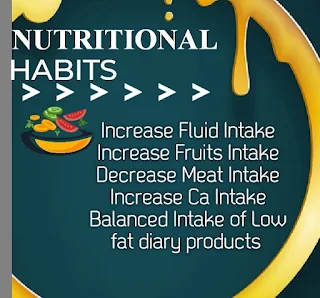.jpg) |
| Image credits- Logo Maker-https://play.google.com/store/ |
Ashmari is Vata Pradhana Tridoshaja vyadhi affecting the mootravaha srotas. Acharya Susruthra have beautifully explained the disease by an simile-
Just as the water, though clear if remained stagnant, forms slushes in course of time, Similarly is the formation of the stone inside the bladder. Just as the rain gets solidified by action of agni, vayu and vaidhu ( thunder), Similarly pitta and vata solidifies the kapha present in the bladder.
Although this simile may be pleasant to hear, but it is painful experiencing condition. This condition isn't an one time occurrence but have many re-entries too.
Hence it is very important to take proper preventive measures and make necessary dietary changes accordingly. Know the promoter and inhibitory factors to make sure you kick blast this condition.
Adhishtana ( Root Source Of Disease) - Sleshma (Kapha Dosha)
What are the main causes leading to the ashmari roga - Roga Nidhana?
Ashmari roga mentioned by our Acharyas is mainly caused due to two reasons-
- Improper purification of the body- Whether it is suppression of natural urges, improper evacuation, Infection etc.
- Unhealthy food and activities- Especially Diet containing Vitamin A deficiency, Hot climatic conditions have high prevalence rate, Promoting factors etc.
The above mentioned causes will vitiates the Vata and aggravates the Kapha dosha, latter combing with urine affects the urinary bladder, producing Calculi alias Ashmari.
As the simile quote stated the stag urine is not the main reason for the formation of the stone. The chemical constituents present in the urine ( presence of more quantities of calcium phosphate, calcium oxalate etc levels which are derived from the food substances) are main reason leading to the stone formation.
High urinary excretion of oxalate, calcium and urate along with Low urine volume act as promoters.
Meanwhile High urinary excretion of Citrate, Potassium and magnesium will be an inhibitor.
Since we know the aetiology of the disease, we shall move to the Signs and Symptoms.
What are the premonitory signs seen in the patients?
In the beginning stage note for the following conditions, and ask the patient whether he/she have experienced any of these.
- Presence of fever
- Pain in bladder, scrotum, penis and body aches
- Difficult micturition
- Thick and turbinated urine.
What are the clinical symptoms of Ashmari (Renal Calculi)?
- Pain in renal angle, hypochondrium and lumbar region.
- Interrupted urine flow
- Blood mixed urine due to obstructed flow- Haematuria
- Presence of Turbid urine
- Pain during activities like walking, running, jumping etc.
- Tenderness in renal angle
Acharya Susrutha, Vagbhatta, Sharangadhara have given clinical symptoms based on the dosa vitiation-
We will just go through the most significant feature-
- VATAJA ASHMARI- Severe pain, stone resembling Kadamba pushpa- irregular in shape, hard, thorny projections, blue colour.
- PITHAJA ASHMARI- Burning sensation, Difficulty in micturition, Stone resembling Bhallathaka seed- yellowish red colour,
- KAPHAJA ASHMARI- Stone resembling Kukudanda (hens egg) and Madhuka pushpa. Patient feels as if bladder is being thorn.
- SUKRASHMARI- Pain and swelling of the bladder and testicles.
Sukrashmari (Seminal calculi) is being seen in young persons.
There are 8 types of kidney stones like oxalate stones, phosphate stones, struvite stone, uric acid stone etc. formed when waste products from the concentrated urine producing crystals gets combined with the stone forming chemical agents like calcium, urate, oxalate etc. These stones may be present in the kidney or may travel down and causes severe pain while urinating. This is what we call Kidney Stone.
What are the investigations done to identify ?
- Blood: ESR, Serum Ca, Creatinine, Blood urea, Uric acid, PTH level
- Urine: Calcium, urate, cystine, pH
- Plain X- ray
- CT scan
Ayurvedic Treatment Management of Ashmari-
- In the premonitory stage it is advised to do Sneha prayoga.
- Pashanabedha grita, Kushadhi grita and Varunadhi grita given according to the dosha predominance.
- Kshara prayoga- with patala and karaveera kshira.
- Kashaya of root of shigru
- Shuntyadhi Kwatha 30 ml in divided dose for 45 days.
- Basti procedure.
6 Best Effective Ways To Prevent Ashmari -
For the Treatment management to be successful, it is the pure dedication from the patients side that is needed by strictly following the preventive measures. By Combining the forces like Therapeutic and Preventive measures, this condition can be very easily managed.
Changes in the nutritional habits will win you the game,
- One should maintain an Balanced Calcium Intake.
- Drink 2.5 litres of water. - Drink 1 litre water in divided quantity early in the morning before breakfast as it helps in cleansing the impurities.
- Avoid Carbonated Sugar
- Increase Fruits Intake
- Decrease meat Intake- chicken, beef, pork.
- Balanced intake of Low Fat Diary Products.
Food That Must Be Avoided.
Below mentioned are the generalized food items that are to avoided, whereas , there is separate list of food items to be avoided by analysing which type of Renal Calculi one is suffering, you can take nutritional advise from the consulting physician
- Chocolate
- Fast food and soft drinks.
- Spinach
- Beetroot
- Tea
- Peanuts and Legumes
- Wheat
- Meat- Beef, Chicken, Pork
- Fish and shellfish
- Eggs
- Eating raw tomatoes and palak have high oxalate levels. Cooked tomatoes and palak can be consumed as its concentration gets reduced highly when processed.
In recent studies have shown that persons who take high dose of Vitamin C supplement have higher chances of Renal Calculi. Although the above mentioned foods to be avoided by the individual suffering, Healthy individuals are not restricted of its consumption, unless not taken in excess amount.
Enjoyed this post? Never miss out on future posts by following to https://follow.it/drpravirasyahridayam?leanpub.





Comments
Post a Comment